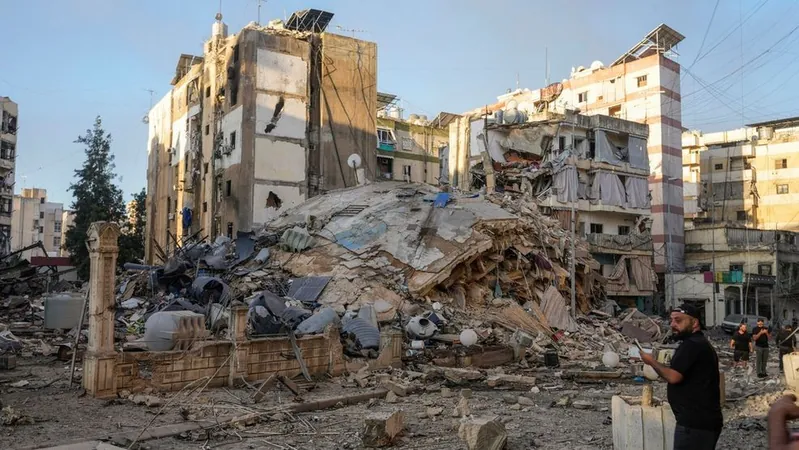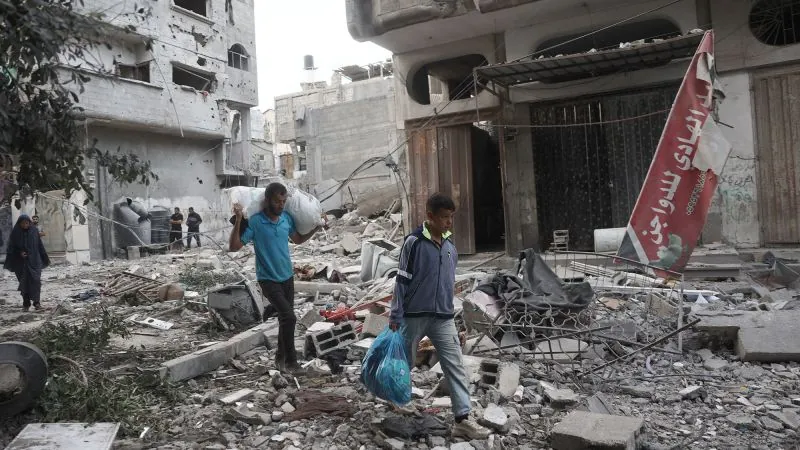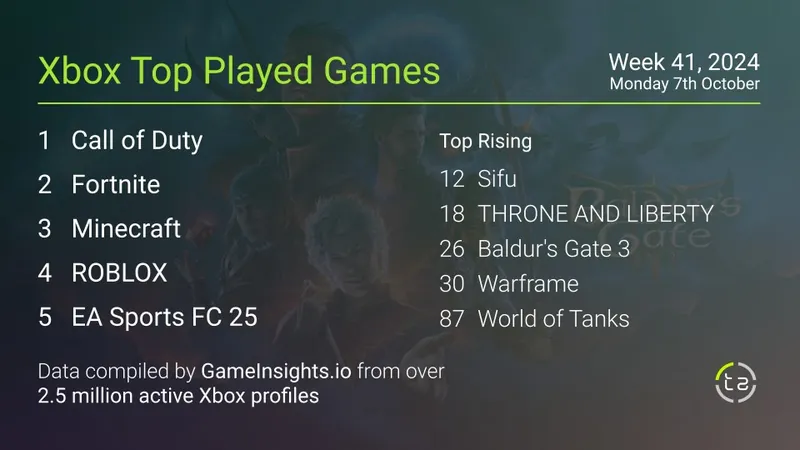
Intensified Israeli Strikes in Beirut and Lebanon-Syria Border Closure Amid Escalating Conflict
2024-10-04
Author: Wei
Overview of Escalating Conflict
In a marked escalation of hostilities, Israel executed a fresh wave of airstrikes over suburban Beirut on Friday, effectively severing the crucial Lebanon-Syria border crossing. This aggressive move occurs as tens of thousands flee the ongoing Israeli campaign against Hezbollah, the militant group entrenched along the border.
Details of Israeli Airstrikes
The overnight bombardments sent towering plumes of smoke billowing into the sky, with shockwaves felt across the Lebanese capital. In the Dahiyeh neighborhood, the intensity of the attacks left devastation in its wake, obliterating buildings and igniting vehicles. Reports indicate that at least one structure was completely leveled during the strikes.
Claims by Israeli Defense Forces
The Israeli Defense Forces (IDF) claimed their strikes were aimed at the central intelligence headquarters of Hezbollah, although they did not confirm if any militants were actually present at the time. Strikingly, they reported a toll of 100 Hezbollah fighters killed within a recent 24-hour period. Lebanese state media noted more than ten consecutive airstrikes targeting the area.
Humanitarian Impact
The conflict has seen tragic casualties; estimates suggest that approximately 1,400 individuals -- comprising both Hezbollah militants and civilians -- have died, with around 1.2 million displaced since Israel intensified its operations in late September. As the airstrikes ensued, Hezbollah retaliated by launching roughly 100 rockets into Israeli territory.
Targeting Key Hezbollah Figures
Just a day prior, Israeli airstrikes claimed the life of Mohammed Rashid Skafi, the head of Hezbollah's communications division, indicating a focused strategy targeting high-ranking members of the organization.
Closure of the Masnaa Border Crossing
Significantly, a strike along the Lebanon-Syria border led to the closure of the Masnaa Border Crossing, marking it the first major disruption since the clashes between Hezbollah and Israeli forces reignited almost a year ago. Israel justified this targeting by alleging it was being utilized by Hezbollah for the transfer of military supplies.
Displacement and Refugee Crisis
Footage from the scene shows massive craters while individuals, stranded by the closure, evacuated in desperation, carrying whatever belongings they could. The recent escalation has seen over 250,000 Syrians and 82,000 Lebanese cross into Syria amidst the turmoil.
Israeli Military Strategy
Following ground escalation orders that began on Tuesday, Israeli forces have engaged Hezbollah militants along the border. The military aims to neutralize Hezbollah's ability to launch attacks into northern Israel, with several key Hezbollah leaders reportedly among the casualties from Israeli strikes in the last two weeks.
Statements from Israeli Officials
As the Israeli military operations continue, Lt. Col. Nadav Shoshani reinforced that their priority is to eliminate Hezbollah influence to restore security for residents in northern Israel.
International Ramifications of the Conflict
However, the conflict's ramifications extend far beyond the border. Iranian Foreign Minister Abbas Araghchi, currently in Beirut, warned of severe repercussions should Israel choose to attack Iran, promising a retaliation more forceful than the missile strikes Iran has already executed in this ongoing conflict.
Potential for Regional War
The escalating tensions have raised the specter of a wider regional war, with Ayatollah Ali Khamenei, Iran’s Supreme Leader, expressing Iran’s preparedness for further military responses during a public sermon in Tehran.
Hezbollah's Retaliation
Adding to the complexities of the situation, Hezbollah commenced rocket fire into Israeli territory following Hamas's initial assault on October 7, which resulted in significant Israeli casualties and hostages. In retaliation, the conflict in Gaza has seen over 41,000 Palestinians reported dead, highlighting the war's devastating human cost.
Operations in the West Bank
The Israeli military also targeted the West Bank in what has become the deadliest operation since the beginning of the war, leading to at least 18 Palestinian deaths in the Tulkarem refugee camp, including a family of four. Israeli officials stated that these operations are aimed at Hamas militants but resulted in civilian casualties as well.
Conclusion
The ongoing conflict between Israel and these militant groups continues to evolve, with each side employing increasingly aggressive tactics, raising urgent international concerns about the potential for escalation into full-scale regional warfare.






 Brasil (PT)
Brasil (PT)
 Canada (EN)
Canada (EN)
 Chile (ES)
Chile (ES)
 España (ES)
España (ES)
 France (FR)
France (FR)
 Hong Kong (EN)
Hong Kong (EN)
 Italia (IT)
Italia (IT)
 日本 (JA)
日本 (JA)
 Magyarország (HU)
Magyarország (HU)
 Norge (NO)
Norge (NO)
 Polska (PL)
Polska (PL)
 Schweiz (DE)
Schweiz (DE)
 Singapore (EN)
Singapore (EN)
 Sverige (SV)
Sverige (SV)
 Suomi (FI)
Suomi (FI)
 Türkiye (TR)
Türkiye (TR)